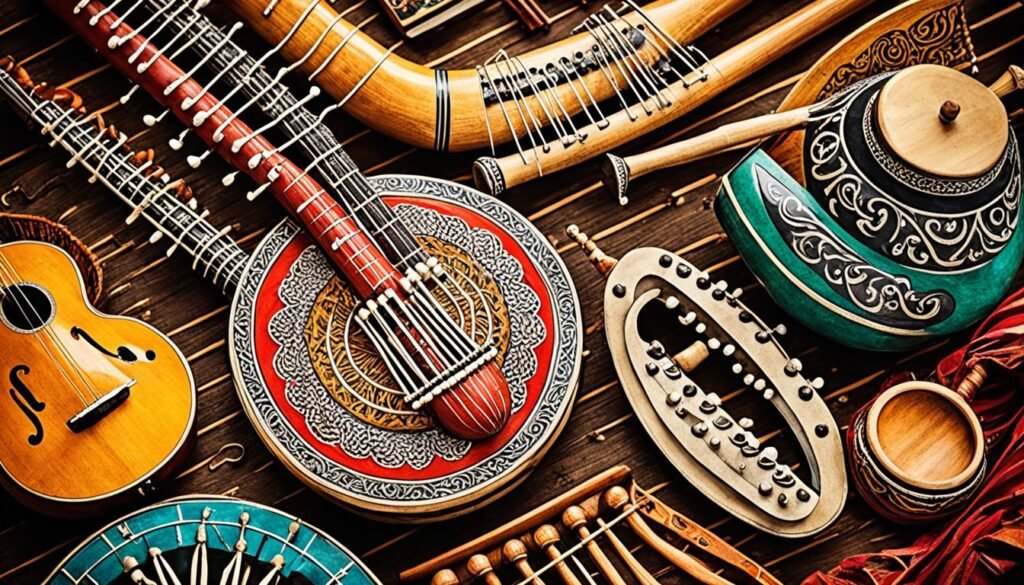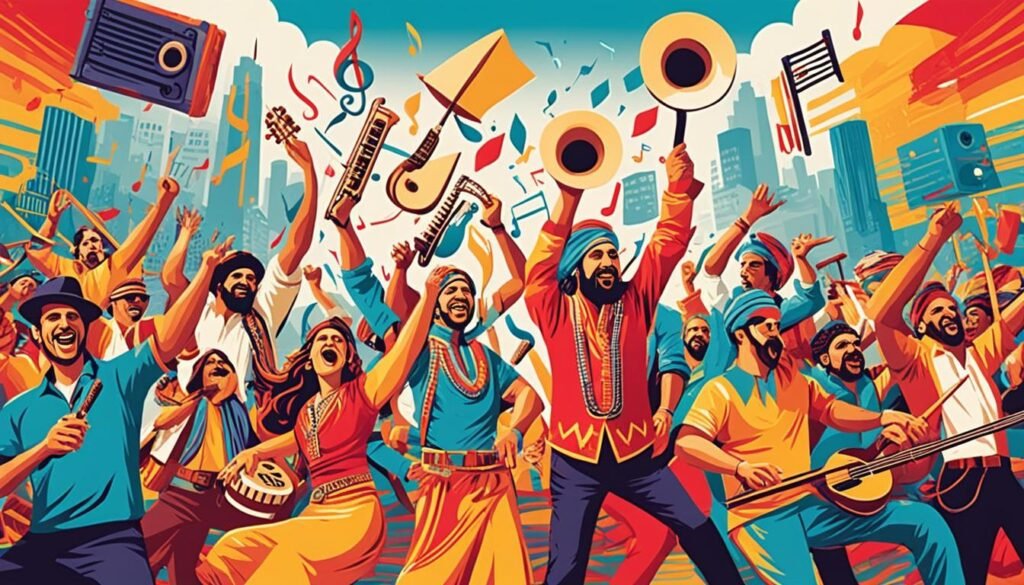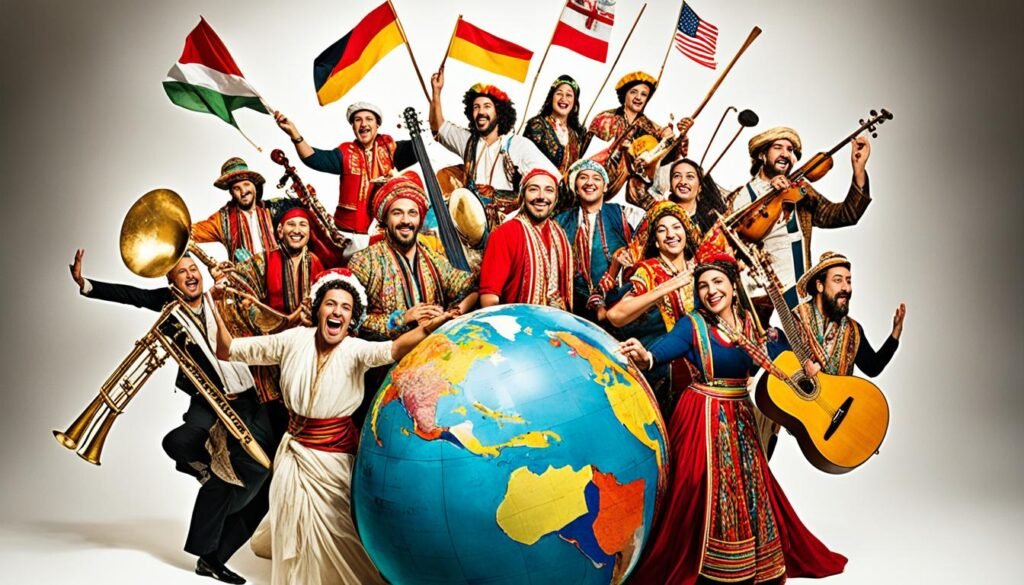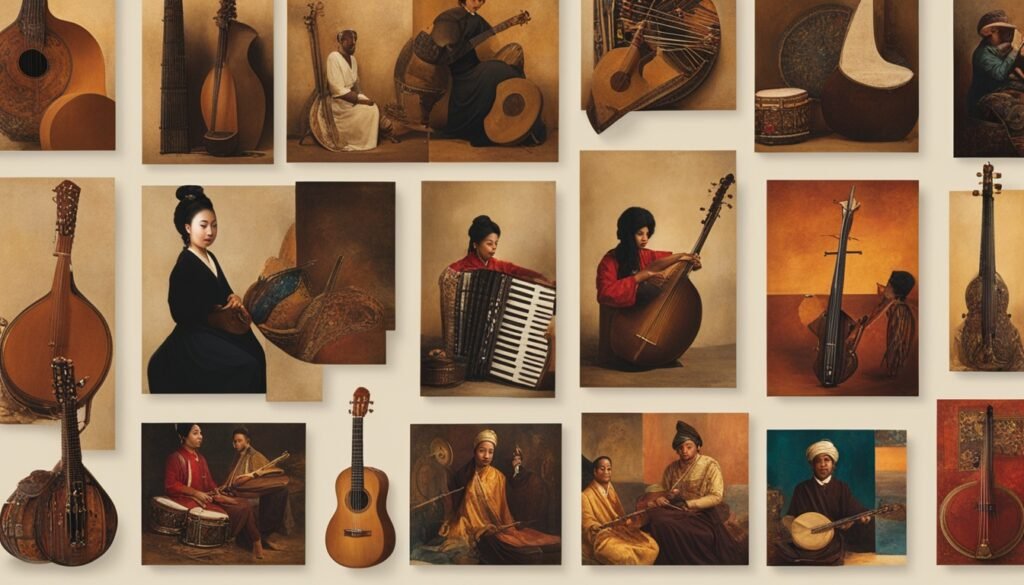History Of Music : Throughout time, music and culture have been deeply linked. Music shows a group’s values, traditions, and identity very powerfully. Many cultures significantly influenced the music we hear today by introducing new genres, instruments, and songs.
For example, from ancient Greece’s lyrical traditions to medieval Europe’s rich music, cultural identity has always shaped music deeply. People all over the world have used music to keep their traditions alive and fight for change. The kind of songs sung, the instruments played, and the style of music shows a culture’s unique experiences and their view of the world.
Music has always been important for cultures and has even helped change society. Now, as the world becomes more connected, different nations’ music and cultures also mix more. This mixing inspires artists to create new and exciting music by using elements from various traditions.
Recently, there’s a big effort to save and celebrate global music traditions. Groups like the Smithsonian Folkways Recordings and UNESCO are key in these efforts. They help protect the music of indigenous groups. This work ensures that very special musical traditions stay alive and keep inspiring people for years to come.
Key Takeaways : History Of Music
- Music has always been closely connected to cultural identity, reflecting the values and traditions of communities around the world.
- Cultural influence has shaped the evolution of music, from ancient Greek lyrical traditions to the rich musical heritage of medieval Europe.
- Indigenous communities have used music as a means of preserving their heritage and inspiring social change.
- Globalization has increased cross-cultural exchange, leading to the creation of new, innovative musical styles.
- Preserving and reviving cultural heritage through music is crucial for maintaining the diversity of global musical traditions.
The Historical Context of Music and Culture
Music has always influenced cultures deeply and driven changes in society. It’s a key way people express their feelings, ideas, and traditions over time. It shows what different societies valued and believed, reflecting their stories through the ages.
Music as a Symbol of Cultural Identity
For ages, music has marked cultural special events and religious practices, from indigenous tribes’ songs to grand classical music. It helps keep cultural memories alive, celebrating what makes them unique. This also helps people connect with their cultural roots and feel proud of where they come from.
Music as a Catalyst for Social Change
Music has often pushed society forward, acting as a voice for those seeking justice. In times like the Civil Rights Movement, songs shaped the fight for equal rights. These tunes and words united people, highlighting shared hopes and pushing for a fairer world.
Music links deeply with who we are and how we interact. It connects us and reminds us of shared experiences. By realizing how much music affects us culturally and socially, we learn about the diverse world we live in.
| Era | Cultural Significance of Music | Examples of Music as a Catalyst for Social Change |
|---|---|---|
| Ancient Civilizations | Music as a means of preserving cultural heritage and identity through religious ceremonies and secular events. | N/A |
| Civil Rights Movement | Music as a symbol of unity and resistance, representing the aspirations of marginalized communities. | “We Shall Overcome,” “This Little Light of Mine” |
| Modern Era | Music as a global language that transcends boundaries and fosters cross-cultural understanding. | Musicians and artists using their platforms to raise awareness and drive social change. |
“Music has the power to immortalize heritage and inspire global connections between people from diverse backgrounds.”
Representation of Cultural Identity Through Music
Music is a key way to show who we are as people. Songs’ lyrics talk about our traditions, history, and issues. The sound and music itself reflect our feelings and life’s moments. This makes music a deep mirror of our culture.
Lyrics as Cultural Expression
Song lyrics are a powerful tool for sharing a culture’s beliefs and stories. They often look at common struggles and dreams, acting as a voice for a community. With lyrics, music becomes a way to tell History Of Music cultural stories.
Traditional Instruments and Sounds
The tools used to make music add another layer to cultural expression. For example, drums and flutes have been used in important ways beyond music. They represent social classes, work roles, and spiritual beliefs in a culture. The sounds these tools make are key in showing cultural identity in music.
Music brings cultural values to life through lyrics and instruments. It’s a strong way to share what makes each group special. By looking at how music protects and shows cultural traditions, we understand the world’s variety better.
| Traditional Instrument | Cultural Significance | Region of Origin |
|---|---|---|
| Djembe | Communal drum used in West African rituals and celebrations | West Africa |
| Sitar | Classical Indian stringed instrument associated with meditation and spirituality | India |
| Didgeridoo | Drone instrument used in traditional Aboriginal Australian ceremonies | Australia |
“Music is the language of the spirit. It opens the secret of life bringing peace, abolishing strife.” – Kahlil Gibran
Music Genres and Regional Styles
The world of music is a tapestry, diverse and rich in music genres and regional music styles. Each type of music shows its home’s cultural background. From the soulful jazz from New Orleans, born from African-American History Of Music traditions, to India’s ancient classical music, culture shapes each note.
Music grows naturally, influenced by the places it comes from. Each music type has its own sounds like instruments, vocals, or words. These show the culture they come from, keeping its story alive.
The world now shares music more easily, mixing different sounds and rhythms. This sharing brings new, unique music that blends old and new traditions. It makes music a universal celebration of our shared stories, going beyond borders.
| Music Genre | Regional Origin | Defining Characteristics |
|---|---|---|
| Jazz | New Orleans, United States | Improvisation, syncopated rhythms, brass instruments |
| Flamenco | Andalusia, Spain | Passionate vocal delivery, intricate guitar work, rhythmic footwork |
| Gamelan | Indonesia | Ensemble of percussive instruments, complex rhythmic patterns, spiritual resonance |
The music genres and regional music styles weave a changing story, full of culture, tradition, and art. As we learn about this music, we learn its message of unity and love. Music is a language that connects us all, showing that our differences are beautiful.
Preserving Cultural Heritage Through Music
Music is key in keeping cultural heritages alive worldwide. It is a strong tool for showing history, traditions, and group identity. This helps in saving and restoring music that might otherwise disappear.
Revival of Indigenous Music
Global efforts are being made to bring back and keep alive indigenous music. For example, in New Zealand, Maorian women perform the haka. This is a traditional war chant, celebrating their culture and teaching it to youth.
The Inuit Tapiriit Kanatami tribe in Canada is focused on teaching their people traditional throat singing. This effort helps keep their unique History Of Music singing style alive.
Smithsonian Folkways Recordings
Smithsonian Folkways Recordings is helping save cultural music. They have collected over 60,000 unique recordings from around the world. This helps keep the musical traditions of diverse communities alive.
UNESCO’s Intangible Cultural Heritage List
UNESCO’s Intangible Cultural Heritage List is doing its part too. This program protects the “living heritage” of communities, including their music, dance, and stories. By doing so, it ensures these cultural treasures are not lost and are shared with future generations.
From saving indigenous music to supporting organizations such as Smithsonian Folkways Recordings and UNESCO, the world is making History Of Music a big effort in this area. Through these actions, cultural heritages are respected and passed down for others to enjoy.
Music’s Influence on Culture Over Time
Music greatly influences society by inspiring and motivating people to make a difference. Songs throughout history have voiced people’s struggles and desires for justice and peace. These songs often become anthems History Of Music for movements striving to solve social issues.
Catalyst for Social Change
In the 1960s, music was a powerful force in the civil rights movement. Songs like Sam Cooke’s “A Change is Gonna Come” and Bob Dylan’s “Blowin’ in the Wind” were crucial. They became anthems against racial discrimination, inspiring people to fight for change.
The anti-war movement during the Vietnam War period was similarly inspired by music. John Lennon’s “Imagine” and Marvin Gaye’s “What’s Going On” emphasized the need for peace. These songs called out the war’s morality, encouraging young people to work for its end.
Music is a universal language that touches people emotionally, uniting them for change. It gives a voice to the voiceless and demands justice for all. Thus, it’s a key force in sparking cultural and social development.
“Music has the power to inspire people to take action and bring about cultural and societal transformations.”
Globalization and Cross-Cultural Influence
The world of music is changing fast thanks to globalization. Now, musical ideas, practices, and instruments are easily History Of Music shared across cultures. This sharing has birthed new fusion genres, adding richness to music globally.
A great example is Reggaeton, which mixes Jamaican dancehall, Latin rhythms, and American hip-hop. Afrobeat, started by Fela Kuti, is another key genre. It combines West African beats with jazz, funk, and a strong political voice.
“Globalization has allowed for a greater exchange of musical ideas and practices, leading to the creation of innovative, cross-cultural genres that have captivated audiences worldwide.”
However, with this blend of cultures comes a concern over cultural appropriation. It’s important to discuss where to draw the line History Of Music between enjoying another culture’s music and stepping over by copying or misusing it.
Challenges aside, music’s global journey proves its ability to unite people. As the world links up more, it opens doors for exciting new music projects and cross-cultural friendships.
The Origins of Music
The start of music is a hot topic. Different views try to explain how music began. Mythical stories from various cultures tell about music’s origins through figures like Jubal. But, a solid, agreed theory on the origins of music still lacks.
Theories on the Origins of Music
Experts offer many interesting ideas on the origins of music. One thought is that music developed for mating. This means those who were better at music found it easier to attract a partner.
Another idea links music’s roots with our need to connect. It may have started as a way of communicating before words. This helped people come together better.
Some suggest music popped up for daily uses, like working together efficiently. It might have made work and life smoother. These varied theories on the origins of music show just how deep and rich music’s history is.
| Theory | Description |
|---|---|
| Sexual Selection | Music arose as a form of sexual selection, with more musically skilled individuals gaining an advantage in the mating process. |
| Shared Precursor with Language | Music and language shared a common precursor, evolving as a means of communication and social cohesion. |
| Practical Needs | Music emerged to fulfill practical needs, such as organizing labor, facilitating communication, or enhancing group coordination. |
The true start of music might always be a mystery. But, the many ideas and its worldwide charm make music key to our history and culture.
“Music has the power to transport us to different times and places, to evoke emotions, and to connect us with our shared humanity.”
Prehistoric Music
The origins of music go back to a time we call prehistoric, before writing existed. We don’t know much about the songs of old, but we find clues in ancient items. These clues show music was important to early societies.
Around 40,000 years ago, people made the first musical instruments. They found bone flutes and simple drums. This shows they used music to History Of Music share stories and their culture way before writing was around.
Though we can’t be sure how prehistoric music sounded, experts have some ideas. They think it could have been for bringing people together, for spiritual ceremonies, or as a way to share important tales.
The history of prehistoric music shines a light on our ancestors’ wish to communicate through melodies. As we find more artifacts, we learn about the music that once echoed in the past.
“Music is a universal language, and its roots can be traced back to the dawn of human civilization. The prehistoric music of our ancestors holds the key to understanding the evolution of artistic expression and the role it played in shaping the cultural identity of these ancient communities.”
Today, the exploration of prehistoric music is still going strong. By understanding how music touched the lives of ancient people, we learn more about ourselves. This shows us how powerful and lasting music can be.
History of Music Around the World
Africa and India have rich musical cultures known worldwide. Their music has a big impact on the music we hear today. Both ancient traditions continue to shape modern music across the globe.
African Music
The story of African music comes from a mix of colorful cultures. Music and dancing go hand in hand in African traditions. They also use call-and-response songs and complicated rhythms. For example, West Africa’s drum music History Of Music and South Africa’s choral songs stand out. African music is a treasure chest for world music.
Indian Classical Music
Indian classical music is very unique, with its Hindustani and Carnatic forms. It focuses on improvisation and uses special melodies and rhythms. This tradition is old and has been influenced by many cultures in India. Indian classical music adds a special touch History Of Music to global music, thanks to its spiritual values.
Indian and African music have shaped worldwide music, like jazz and Latin sounds. They keep their rich musical histories alive for everyone to enjoy.
“Music is the universal language of mankind.” – Henry Wadsworth Longfellow
Throughout history, music has evolved from its origins in prehistoric times, developing into diverse forms and genres that reflect cultural expression and artistic innovation. From the medieval chants of Gregorian monks to the polyphonic compositions of Josquin des Prez and the orchestral works of Antonio Vivaldi and Wolfgang Amadeus Mozart, composers have used musical notation to write and produce music across various periods like the Baroque, Classical, and Romantic eras. Stringed instruments, such as the harp and flute, have played significant roles in both secular History Of Music and religious music, while percussion instruments and electronic synthesizers have transformed musical styles, shaping modern compositions and electronic music genres.
The development of musical theory and notation by the Greeks and in the Renaissance period laid the groundwork for understanding History Of Music and creating music as an art form, enabling composers like Franz Schubert, Joseph Haydn, and Ludwig van Beethoven to produce intricate musical expressions that continue to resonate today.
Also Read : Exploring The Impact Of Lyrics On Meditation
Conclusion
Music and cultural identity are tightly woven together through history. This connection is seen in the use of unique lyrics and instruments. Also, in how regional music styles keep cultural traditions alive. Music has been a major force for change in society, bringing about positive transformation.
With the world becoming more global, the link between music and culture grows stronger. This shows how powerful music is in bringing people together. It offers a way for societies to express themselves. It is also a tool for making the world a better place.
The strong bond between music and cultural heritage cannot be ignored. This bond highlights the need to protect and appreciate music’s power to unify. Music’s story with culture is an ongoing symbol of our endless creativity and spirit.
FAQs
Q: How did different cultures contribute to the history of music?
A: Various cultures around the world have made significant contributions to the evolution of music throughout history. From the Greeks in ancient times to the Renaissance period and beyond, each culture has brought its unique style, instruments, and forms of music that have influenced the development of music as we know it today.
Q: What is the significance of the Renaissance period in music history?
A: The Renaissance period was a time of great musical innovation and creativity. It marked the transition from the medieval to the modern era, with composers like Josquin des Prez and Antonio Vivaldi making lasting contributions to musical composition. The period also saw advancements in musical notation, leading to the creation of more complex polyphonic music.
Q: How has the evolution of music shaped the future of music?
A: The evolution of music, from the Baroque and Classical periods to the Romantic era and beyond, has paved the way for modern music genres and styles. Innovations such as the use of electronic music and synthesizers have transformed the way music is created and enjoyed, shaping the future of music in exciting and diverse ways.
Q: What are some common forms of music that have withstood the test of time?
A: Throughout history, various forms of music have remained popular and enduring. From secular music enjoyed by the masses to liturgical music used in religious settings, forms like instrumental music, vocal music, dance music, and folk music have all played significant roles in the musical landscape of different eras.
Q: What role did different composers play in the development of music?
A: Composers across different time periods, such as Joseph Haydn, Wolfgang Amadeus Mozart, and many others, have played a crucial role in shaping the course of music history. Their compositions, innovations in musical theory, and adherence to musical notation standards have contributed greatly to the richness and diversity of music as an art form.
Q: How has music been depicted in different cultures throughout history?
A: From the earliest depictions of musical instruments in prehistoric times to elaborate rules of music in ancient civilizations, evidence of music as a fundamental aspect of human culture can be found across various historical eras. Whether in the form of religious music, blues music, or compositions from different periods, music has played a central role in the artistic expression of diverse societies.
Q: What are some of the oldest known musical instruments and their contributions to music?
A: The history of music is intertwined with the development of musical instruments, with ancient artifacts revealing some of the oldest known instruments used for creating music. Instruments like the harp, depicted in ancient cultures, and the use of written music in the medieval period have provided valuable insights into the origins and early forms of musical expression.
Source Links
- https://en.wikipedia.org/wiki/History_of_music
- https://www.trala.com/resources/how-does-music-influence-culture
- https://libguides.brooklyn.cuny.edu/music1300/chapter8









